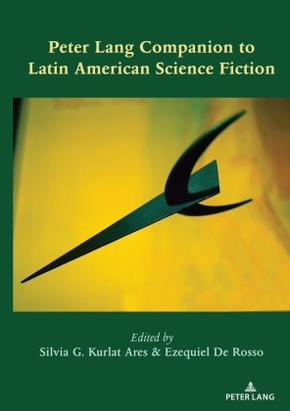
Peter Lang Companion to Latin American Science Fiction
| Verlag | Peter Lang |
| Auflage | 2021 |
| Seiten | 378 |
| Format | 17,8 x 2,6 x 25,4 cm |
| Gewicht | 833 g |
| Artikeltyp | Englisches Buch |
| EAN | 9781433152177 |
| Bestell-Nr | 43315217UA |
The Peter Lang Companion to Latin American Science Fiction provides a comprehensive overview of science fiction in Latin America by addressing the history and criticism of the genre in the region.
The Peter Lang Companion to Latin American Science Fiction provides a comprehensive overview of science fiction in Latin America by addressing the history and criticism of the genre in the region. It not only maps the cornerstones of the field (books, comics, magazines, movies) but also studies the specific political, social and cultural concerns that gave rise to its distinctive patterns and ideas. This volume organizes and systematizes the state of the field. In this sense, the aim of the Companion is to analyze Latin American science fiction hand in hand with the literature and culture produced in the rest of the region, providing a proper context for its historic, cultural and political themes. Taking into account the complexity of contemporary debates in the field, the editors have made a point of inviting contributors from a wide variety of countries to provide the most diverse possible set of perspectives on the development of science fiction in Latin America.
Th e volume serves the needs of readers interested in science fiction at large, either in its original language or in translation; students trying to understand the genre; and teachers seeking to address the main issues in the development of the genre in the region by including current approaches to the material. The Companion is an indispensable teaching and learning tool, as well as reference book for critics and interested readers.
Rezension:
"This all started about sixty years ago. In Argentina, there were very few science fiction readers: people like Patricio Esteve, Angélica Gorodischer, Héctor R. Pessina, some Latin teachers and me. However, Paco Porrúa was editing the best of the genre, Borges appreciated it, and Bioy Casares practiced it. The academic world, with the notable exception of Raúl H. Castagnino, preferred to ignore it. As a student, I remember being reprimanded for writing about Lovecraft without waiting for the approval of French criticism. A couple of generations later, I found myself participating in international conferences on science fiction, which the university itself now convened. What was once the subject of sarcasm had become a respectable subject. What had happened? Well, the readers, ignoring academic admonitions, had multiplied. The genre tempted writers and mobilized researchers. If there were so many explorers and cartographers, it was because the forest had grown beyond expectations. Perhaps much of what was being written was not liked by veterans like me, but we had always promoted variety. Age can drive us to skepticism or resentment, but it can also give us the pleasure of tasting the fruits of what we once sowed. A book like this one, which explores the rich and multifaceted landscape of Latin American science fiction, is the best proof." -Pablo Capanna, Philosophy Professor, sf specialist, columnist for the Minotauro and El péndulo magazines

